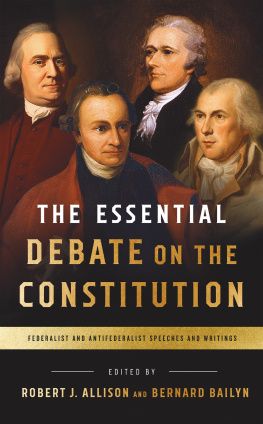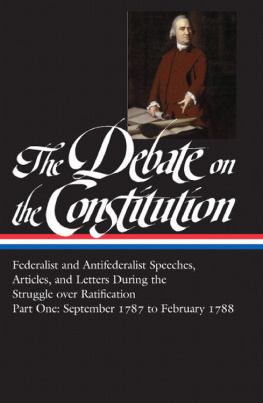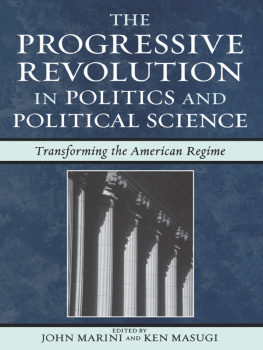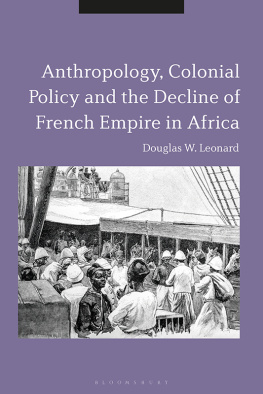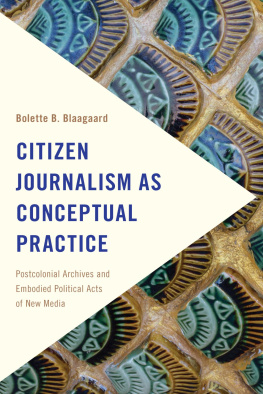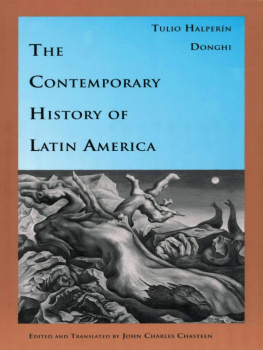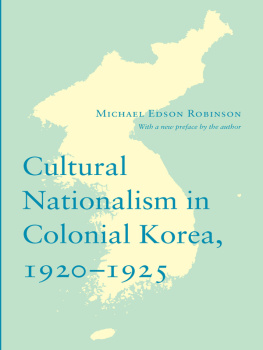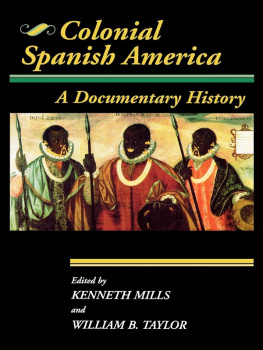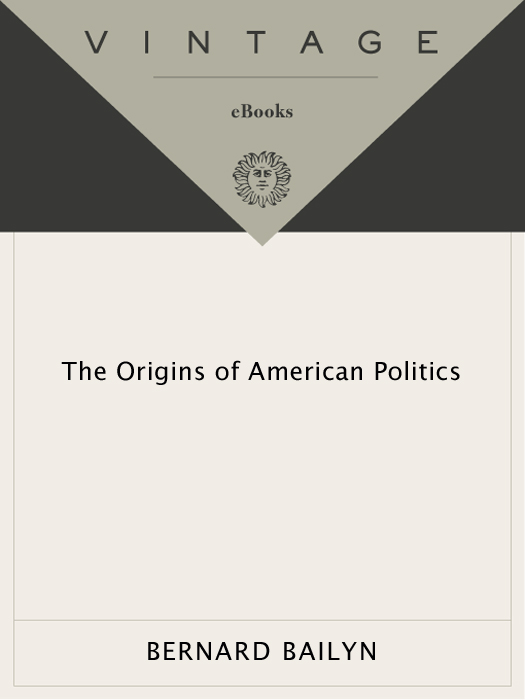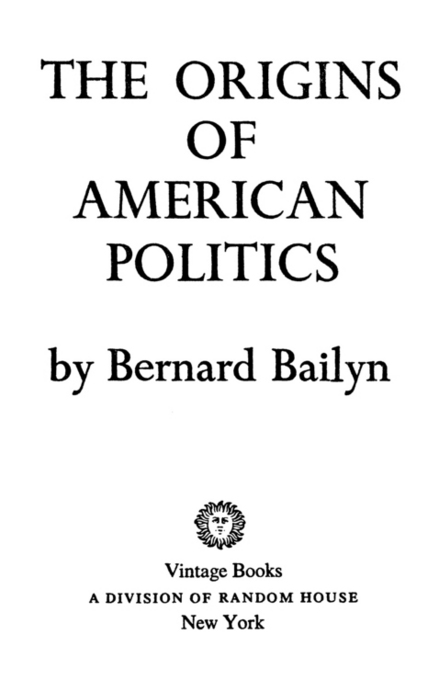Copyright 1967, 1968 by Bernard Bailyn
All rights reserved under International and Pan-American Copyright Conventions. Published in the United States by Random House, Inc., New York, and simultaneously in Canada by Random House of Canada Limited, Toronto.
Originally published by Alfred A. Knopf, Inc., in 1968.
Previously published in Perspectives in American History. Volume 1 (1967), by the Charles Warren Center for Studies in American History, Harvard University.
Library of Congress Catalog Card Number: 68-12665
eISBN: 978-0-307-79851-0
v3.1
for
LOTTE

T HESE THREE ESSAYS , which were delivered in their original form in November 1965 as the Charles K. Colver Lectures at Brown University, mark the convergence of two separately undertaken efforts of historical interpretation begun almost a decade ago. The first was a study of politics in America before the Revolution. This was a subject, I found, that had entered into the historical literature in many ways but that remained nevertheless obscureremarkably obscure when one considered the prominence, indeed the dominance, of politics in the historiography of eighteenth-century England. Where for a generation historians of eighteenth-century England had dealt familiarly with the details of party or faction, historians of eighteenth-century America had touched on politics only incidentally, and when they had, had conveyed to their readers only the sense of triviality and boredom so well expressed almost a century ago by a diligent graduate student at Johns Hopkins University, Woodrow Wilson, who went into his colonial history examination, he wrote, crammed with one or two hundred dates and one or two thousand minute particulars about the quarrels of nobody knows who with an obscure Governor, for nobody knows what. Just think of all that energy wasted! The only comfort is that this mass of information wont long burden me. I shall forget it with great ease.
The obscurity and apparent triviality of pre-Revolutionary politics seemed to me to result, first, from a lack of clarity in definition. Politics is not the same as government, though the two are of course intertwined. The history of government is the history of those formal public institutions and procedures that constitute the framework of legal authority. The history of politics is the history of the ways men have used these instruments of power, the history of the struggles for authority, hence of the rivalries, factions, and interests that swarmed through and about the agencies of government. Failing to conceive of the struggle for power in pre-Revolutionary America as in itself a distinct process, historians with rare exceptions have merged it on the one hand with the history of formal institutions, and on the other with the chronicle of public transactions.
But the obscurity of early American politics is not the result of a lack of definition and focus only. Politics in the colonial period is a subject peculiarly difficult to locate within the broader dimensions of American history. Just as governmental institutions in pre-Revolutionary America were part of a larger grouping of institutions centering in England, so the pattern of political activity in the colonies was part of a more comprehensive British pattern and cannot be understood in isolation from that larger system. But the political system of the mid-eighteenth century, unlike much of the governmental system, came to an end in the thirteen colonies in 1776; it has no climax in the state and national party politics of later periods of American history. There is, consequently, no obvious eventuality to point to, and as a result no self-evident, pre-established principle of relevance for the historian to bring to his work. Even within the pre-Revolutionary period itself there is no obvious trend of development. Though there are on the surface certain evidences of growing maturity and progressive approximation of modern forms, the story of politics in the colonial period is not that of a distinct evolution toward the modern world: the evidences of growing modernity are delusive.
With these considerations in mind I proceeded with the study of politics in pre-Revolutionary America. But while I was engaged in this, a second project intervened, which I originally undertook as a divergence: the preparation of an edition of pamphlets of the Revolution. This led, as I have elsewhere described, to a general investigation of the ideological origins of the Revolution, and in the end to the assertion that the effective, triggering convictions that lay behind the Revolution were derived not from common Lockean generalities but from the specific fears and formulations of the radical publicists and opposition politicians of early eighteenth-century England who carried forward into the age of Walpole the peculiar strain of anti-authoritarianism bred in the upheaval of the English Civil War. I found tooand at this point I began to note a convergence of the separate lines I had been followingthat the configuration of ideas and attitudes I had described as the Revolutionary ideology could be found intact, completely formed, as far back as the 1730s; in partial form it could be found even earlier, at the turn of the seventeenth century. More important still, it became clear that these ideas, which would become the Revolutionary ideology, had acquired in the mid-eighteenth-century colonies an importance in public life that they did not then have, and never would have, in England itself. The problem no longer appeared to me to be simply why there was a Revolution but how such an explosive amalgam of politics and ideology came to be compounded in America in the first place, why it remained so potent through years of surface tranquillity, and why, finally, it was detonated when it was.
In this way I was led back to the subject of early American politics, but now with a specific question in mind: what differences were there between the political processes in eighteenth-century America and eighteenth-century England that could explain the significantly different receptions of the same political ideas? It was a question, I found, that immediately gave shape to the political data I had gathered. The invitation to deliver the Colver Lectures at Brown University offered an opportunity to bring these materials togetherthe ideological, from the study of the Revolutionary writings and their antecedents, and the politicalinto a single brief statement of explanation. It is this statement, written out somewhat more fully than the original lecture form permitted, that appears in the pages that follows.
I am grateful to the faculty and students of Brown University for their kindness to me at the time these lectures were given. I wish to express my thanks especially to Professor Elmer E. Cornwell, Jr., Chairman of the Political Science Department, and to my friends in the History Department, William G. McLoughlin, John L. Thomas, and the late Klaus Epstein, for their warm hospitality.
Jane N. Garrett assisted me in combing through the vast bulk of eighteenth-century newspapers and pamphlets and in settling a number of specific questions that arose in preparing the manuscript. The various drafts were read over and commented on by John Clive and Lotte Bailyn; their criticism at every stage was invaluable. When I first undertook the study of early American politics I was aided by grants from the Rockefeller Foundation and the Center for the Study of the History of Liberty in America. I am indebted to both of those organizations, and to the staffs of two splendid librariesthe Widener Library, at Harvard University, and the Baker Library, at Dartmouth Collegefor help most generously given.


